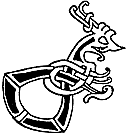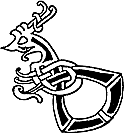 |
Pronoucing Welsh |
 |
One of the best explanations for pronoucing Welsh is found in Susan Cooper's book The Grey King, Athenum 1975. This article is adapted from that book. Thanks to Mistress Rebecca of Twynn for pointing it out to me.
Welsh looks more complicated than it is. Although some sounds in Welsh will never be perfected by a non-native-born speaker, we can get close.
Try to pronouce Afon Dyfi. Now, try again, but remember that f is pronouced v Did you get Avon Divvy? That is closer. Y is mostly pronounced like the u in 'hunt'. The closest pronunciation is Avon Duvvy.
Now try Mynydd Ceiswyn. Double d always sounds like the th in leather. The c sound is always hard, as in cat. The g sound is also always hard as in go. W is almost always pronounced oo as in pool. Now try again. You should get Munuth Kice-oo-un which is correct, except for the ending which should be Kice-oo-in. This is one of the exception words, and sorry, there is no rule.
Now try cemmaes. The s is hard. If you say it fast, it comes out like Kemmess, chemist without the t.
Say Llangelynin. Here comes the tough sound, the ll. This is the proof of a true Welshman. Open your mouth a little and put the tip of your tongue against the back of your front teeth. As if your'e just about to say lan; now while your tongue is there, blow around the side of it. Both sides at once...Now say the word lan but give it a blow before you bring it out, like this: llan, llan. This isn't the way a true native speaker would form the letters, but it is a lot closer than the usual way out which is to say ll like th.
Try Machynlleth. The ch is pronounced like loch in Scots Gaelic or ach as in the German Achtung!.
One more. Say Bran as in the man's name. It isn't pronounced like a breakfast cereal, but has a longer sounding a. Try braaaan.
You might want to recommend The Grey King to some of your junior high school friends (or read it yourself, it's excellent). Also in the same vein are her books Silver on the Tree and The Dark is Rising.

Back to Early Period #6 |
Back to Early Period Index |
Back to PastTimes




